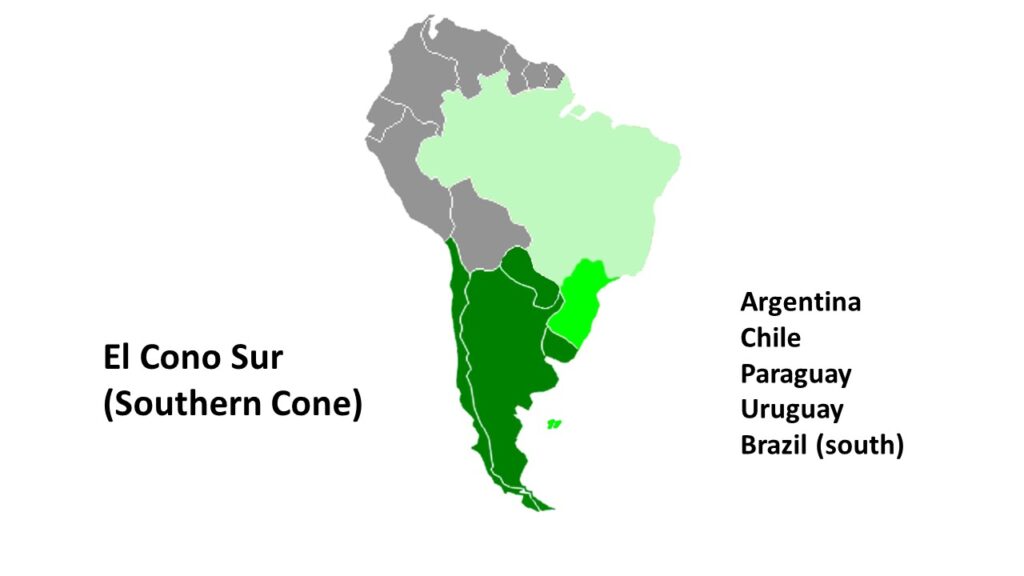The Southern Cone (El Cono Sur), home to Argentina, Chile, Paraguay, Uruguay and southern Brazil is a huge region with plenty of opportunities for TEFL teachers to find work. But how much can you earn there?

Typically, TEFL teachers in Argentina, Chile, Paraguay and Uruguay earn $800-1,200 a month while working at the main source of employment, language academies. Private tutors generally make $10-20 per hour.
There is, of course, some variance between the countries. And if you’re wondering about the other country in El Cono Sur, Brazil, I’ve got a whole article for that: How Much do TEFL Teachers Make in Brazil?
Searching for the perfect TEFL destination with the best earnings? Compare countries around the world with my free resource: How Much Do TEFL & TESL Teachers Make? Countries compared.
Options and earnings for TEFL teachers in Argentina, Chile, Paraguay and Uruguay
Language academies are by far the number one employers of TEFL teachers in this region of South America.
Private tutoring is another good earner. You can do this as a side gig, or as a full-time freelancer if you can get the right visa.
In this article, I’ll use US$ as the currency throughout for clarity and ease of comparison. Now let’s look at each country’s individual salary figures.
Argentina
| Earnings Source | Per Hour ($) | Hours Per Week | Per Month ($) | Annual Estimate ($) |
|---|---|---|---|---|
| Language Academies | 6-12 | 20-30 | 600-1,200 | 7.2K-14.4K |
| Private Tutoring | 10-20 | 20 | 800-1,600 | 9.6K-19.2K |
Chile
| Earnings Source | Per Hour ($) | Hours Per Week | Per Month ($) | Annual Estimate ($) |
|---|---|---|---|---|
| Language Academies | 8-12 | 20-30 | 800-1,200 | 9.6K-14.4K |
| Private Tutoring | 15-30 | 20 | 1,200-2,400 | 14.4K-28.8K |
Paraguay
| Earnings Source | Per Hour ($) | Hours Per Week | Per Month ($) | Annual Estimate ($) |
|---|---|---|---|---|
| Language Academies | 7-15 | 20-30 | 700-1,500 | 8.4K-18K |
| Private Tutoring | 10-20 | 20 | 800-1,600 | 9.6K-19.2K |
Uruguay
| Earnings Source | Per Hour ($) | Hours Per Week | Per Month ($) | Annual Estimate ($) |
|---|---|---|---|---|
| Language Academies | 7-13 | 20-30 | 700-1,300 | 8.4K-15.6K |
| Private Tutoring | 10-20 | 20 | 800-1,600 | 9.6K-19.2K |
Compared to most countries in South America, these salaries are typical. They’re lower than many other parts of the world, like Europe, East Asia and the Middle East, but to really put them into context, you have to consider the cost of living.
Monthly living costs in this part of the world are relatively low:
- Argentina: $800-1,200
- Chile: $700-1,100
- Uruguay: $900-1,300
- Paraguay: $700-1,400
Salaries are enough to cover your expenses, and little more. Unless you pack your schedule with private classes, you’re unlikely to save any money, but with only 20-25 teaching hours a week, there’s plenty of time to enjoy living there.
Getting a visa in these countries is relatively straightforward if you get employed by a language academy.
Some TEFL teachers working freelance border hop. This is where you work on a tourist visa for 90 days, then cross the border with a neighbouring country and immediately return, with the 90 days starting again.
This is technically illegal, and I wouldn’t recommend it. But many do it, and some employers encourage it to avoid paying visa costs.

The academic year in the countries of El Cono Sur runs from February/March to December, with the southern hemisphere’s summer holiday during December and January.
How much do TEFL teachers make in language academies in Argentina, Chile, Paraguay and Uruguay?
Language academy jobs are the best bet for most people. With a relatively light working week and short contracts (usually 6 months), they’re flexible and easy to get.
At language academies in Argentina, you can expect to earn $600-1,200 per month; Chile $800-1,200; Paraguay $700-1,500 and Uruguay $700-1,300.
To get this kind of job, you don’t usually need a bachelor’s degree (any subject), although many employers prefer one. Nor do you need a wealth of teaching experience.
A minimum requirement for almost every job is a 120-hour TEFL certificate. Some employers don’t require one, but I’d steer clear of academies with standards that low.
If you’re looking for great value TEFL certificates, I recommend International TEFL and TESOL Training. Click the link for 15% off all courses (I receive compensation, so you’re supporting me, too). Not convinced? Read why I’d choose ITTT over other TEFL course providers.
In Argentina, most language academies are found in the capital, Buenos Aires. It’s a similar story for Paraguay and Uruguay, with Asunción and Montevideo respectively hosting the majority of these types of school. In Chile, things are a little more spread out, but Santiago naturally has more than other cities.

ESL Base provides brilliant lists of language academies in a country. You can check out your options by following these links:
How much do TEFL teachers make from private tutoring in Argentina, Chile, Paraguay and Uruguay?
Private tutoring is always a great option for TEFL teachers. Whether you do it as a side gig to supplement a language academy income, or go full time as a freelancer, the hourly pay is usually higher and you can set your own schedule.
How much you charge depends on your experience, qualifications and location. Tutors in big cities typically have access to students who can pay more.

In Argentina, Paraguay and Uruguay, typical hourly rates for private English classes fall between $10 and $20. This means if you get 20 classes a week, you can earn $800-1,600 a month.
Private English tutors in Chile generally charge $15-30 per hour. A 20-class week nets you $1,200-2,400 per month, which is much higher than what you can earn in most language academies.
For the full guide on becoming an English tutor, read my article: How to Get Started as an EFL/ESL Private Tutor.
Conclusion
Making a fortune working as a TEFL teacher in El Cono Sur is out of the question. Most people will earn enough to live in relative comfort and little more, but that doesn’t mean it’s a bad place to teach.
Countries in this part of the world have vibrant cultures, unbelievable scenery and a lifestyle that allows time to explore, meet new people and grow as a person.
Why not head over to my resource: How Much Do TEFL & TESL Teachers Make? Countries compared to see what countries around the world can offer?







